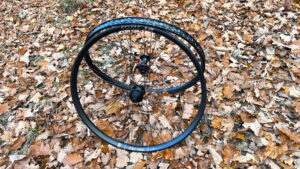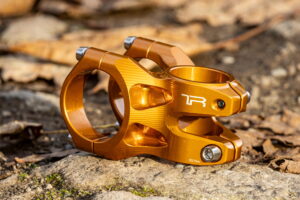Seriously lightweightand and dripping in top-drawer XTR components
Merida One-Twenty RC 9.9000 first ride review
The Merida One-Twenty RC is a short-travel trail bike, with an emphasis on marathon XC racing. Full carbon chassis, carbon wheels and cockpit.
>>> Best XC race bikes: hardtail and full suspension
Merida One-Twenty RC 9.9000 need to know
- Suspension travel has been reduced to 120mm front and 100mm rear, compared to the more trail-ready ‘standard’ One-Twenty with its 130mm/120mm mix
- Impressively light 10.71kg bike
- Wish list-level components include a 12-speed Shimano XTR groupset and Fox Factory-level suspension

Marathon racing is a niche within XC competition, where the increased race distance drives up the demands on both the bike and rider. It’s a punishing pursuit, often with multi-day events in terrain as varied as high-speed fire road, to super-tech alpine trails that wouldn’t look out of place in an enduro race.

Factory-level suspension delivers 100mm travel via Float Link configuration
What type of bike works best for marathon racing? Often it’s a beefed-up XC race machine, but sometimes, as is the case with this Merida One-Twenty RC 9.9000, brands take a different approach. By effectively stepping down its capable 120mm-travel trail bike, Merida is coming at marathon racing from a slighly different angle.

The One-Twenty RC’s a race whippet with the stamina of a wolf
By reducing travel to 100mm on the rear and 120mm up front, while adding a lightweight build kit, the One-Twenty RC 9.9000 retains a durable chassis and more relaxed handling than a conventional XC bike. Built around a carbon Merida One-Twenty frame, the RC version adopts the same Float Link design found on all Merida full suspension bikes. This linkage-driven system positions both upper and lower shock mounts on active parts of the design, effectively allowing the shock to ‘float’, so the progression rate is influenced by linkage movement at both ends. This results in a system that provides ample initial stroke suppleness and small-bump sensitivity yet delivers a level of increasing progression to prevent it feeling overwhelmed when you inevitably overstep the limits of either bike or rider.

Step-Cast fork walks the line between light weight and stiffness
How did Merida reduce rear travel without messing up the geometry? It simply swapped to a shorter-stroke shock. Doing this allowed Merida to employ the same carbon front triangle as the other One-Twenty models without needing to adapt or change any of the parts. Best of all, riders retain the option to increase travel on the rear by fitting a longer-stroke shock, again, without messing up the geometry.

Carbon front triangle is the same as that used by other One-Twenty models
What’s new on the RC version is the full carbon rear end. Taken together with all the high-end parts, the compete bike costs £3,700 more than the next model down with an alloy rear end. Still, Merida has created a carbon rear end that combines elegant profiles with dimensions that scream stiffness, adding race-level performance while contributing towards the 9.9000’s impressive 10.71kg (23.61lb) weight.

180mm rotors and XTR calipers are a speed-scrubbing match made in heaven
Geometry-wise, the RC still shares a lot of measurements with the trail-focused One-Twenty but they aren’t identical. The drop in fork travel by 10mm steepens up the angles a touch and lowers the BB height a hair. And it’s pretty conservative as a result, with a 67.6° head angle. Not really a modern downcountry XC bike then, but slack enough to allow for some recovery on descents. To further hone the RC’s capability, Merida has switched to a shorter 42mm offset fork to quicken steering response and tighten handling.

Remote lockout makes for a cluttered bar
If you’re expecting a whippet-fast ride then, you will not be disappointed with the One-Twenty RC. While it’s true that any sub-11kg bike with semi-slick Maxxis tyres and stiff, carbon DT Swiss wheels will feel fast racing across flat terrain and rocketing up climbs, the Merida capitalises on its more trail-focused geometry and capable suspension to actually be lightning quick everywhere.

Maxxis Rekon Race tyres were quick but a tad too slick
Yes, the supple and lively demeanour of the rear suspension means you’re grateful Merida specced the tri-mode Fox shock with its ability to tighten up the rear suspension and minimise energy loss when tackling flat-out climbs. And while it’s great that the Merida’s descending ability is far superior to a lot of race bikes, as a marathon bike there’s less demand for outright pedalling efficiency, so we’d much rather see a remote lockout hard-wired to the shock than the fork.
Another hangover from XC racing is the narrow bar and tip-toe stance created by the tall BB, the latter allowing you to keep the cranks spinning in rocky terrain. Unfortunately, this also tends to put you over the bike, rather than in it, which in turn produces nervy, edgy handling. And while that’s fine for hardened racers – and let’s face it, this bike will appeal most to that market – it might not be the most confidence- inspiring for less seasoned riders.
Even though I come from a background in XC racing, there were still plenty of times when I rode the One-Twenty RC 9.9000 and found myself wishing Merida had fitted wider handlebars alongside a grippier front tyre just to inject a bit of calm into the ride.
The bike comes with a 150mm KS dropper post, but I actually felt more comfortable and in control descending with the saddle in a higher position, rather than fully slammed – the saddle touching my thighs adding an extra level of stability to this featherweight race machine.
As modern-day marathon race bikes go, Merida has produced a bit of a winner. The spec is completely race ready through to the smallest detail, and the crossover nature of the shock settings mean you can tune the ride between tight and efficient racer and plush, short-travel mile-muncher. I’d just prefer to be able to toggle between shock settings without taking my hand off the handlebar, like you can on the Scott Spark or the YT Izzo.
















